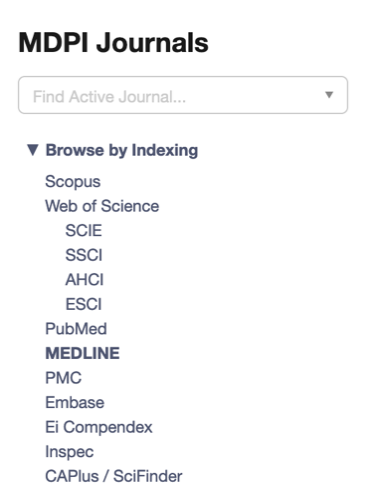
Journal Menu
► ▼ Journal Menu-
- Biomolecules Home
- Aims & Scope
- Editorial Board
- Reviewer Board
- Topical Advisory Panel
- Instructions for Authors
- Special Issues
- Topics
- Sections & Collections
- Article Processing Charge
- Indexing & Archiving
- Editor’s Choice Articles
- Most Cited & Viewed
- Journal Statistics
- Journal History
- Journal Awards
- Conferences
- Editorial Office
Journal Browser
► ▼ Journal BrowserNeed Help?
Announcements
7 August 2024
MDPI Insights: The CEO's Letter #14 - New Headquarters, Marketing, Poland

Welcome to the MDPI Insights: The CEO's Letter.
In these monthly letters, I will showcase two key aspects of our work at MDPI: our commitment to empowering researchers and our determination to facilitating open scientific exchange.
Opening Thoughts

MDPI Moves to New Headquarters in Basel, Switzerland

I am excited to share that MDPI has moved to a new state-of-the-art office space in Basel, Switzerland. This move consolidates our operations by bringing together our two previously separated Basel offices into one central location.
We are always growing our talent pool and encourage you to view our Careers Page for the positions available in Basel and across our offices.
New Address: Grosspeteranlage 5, CH-4052 Basel, Switzerland
Effective Date: 1 July 2024
This new chapter in our company’s journey is designed to continue our mission of positioning MDPI as a leader in Open Access (OA) publishing, highlighting our commitment to making scholarly research accessible to everyone.

Boasting modern amenities, improved meeting and event spaces designed to support our growing needs, the new location provides a more collaborative and efficient working environment for our employees. The location offers convenient accessibility to public transportation and is situated near the Basel SBB railway station, with a variety of nearby services and amenities.
In fact, I can see the trains right outside of my window as I write these lines!
This move marks an exciting milestone in MDPI’s development, and I am confident that the new headquarters will serve as an inspiring and productive space for everyone. We also very much look forward to welcoming visitors here. You can read more about MDPI's history here.
“This new chapter continues our mission of positioning MDPI as a leader in OA publishing”
For Those New to MDPI
A pioneer in scholarly, Open Access publishing, MDPI has supported academic communities since 1996. MDPI is leading the transition to Open Science by making a greater proportion of the research conducted worldwide free and accessible to everyone. To date, over 3.5 million researchers have entrusted MDPI with publishing their scientific discoveries. MDPI’s editorial process is bolstered by a network of dedicated reviewers, a team of 6,000 professional, well-trained staff members, and an in-house article submission platform designed to ensure efficient processes within its 440 fully Open Access titles. MDPI supports more than 800 academic institutions worldwide, helping them adhere to national mandates while facilitating authors’ publication in fully compliant (CC BY) Open Access journals.
Impactful Research
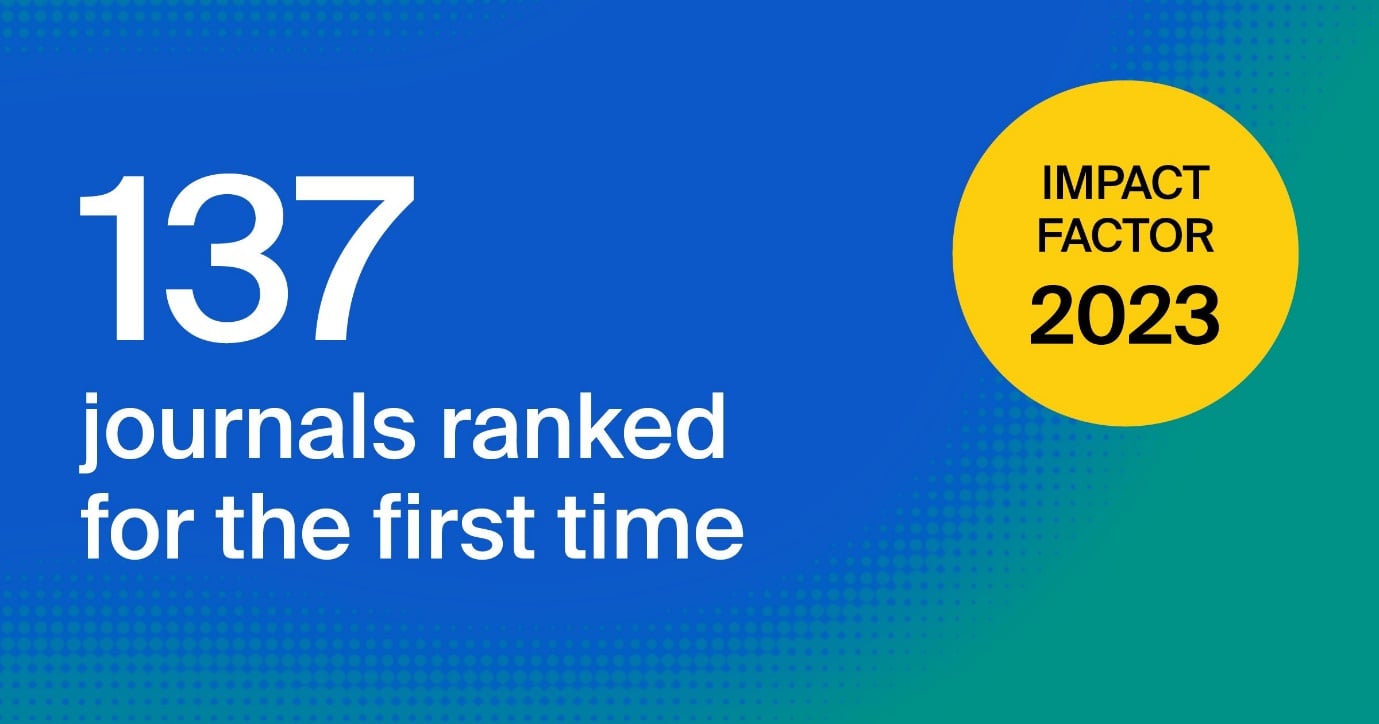
New and Emerging MDPI Journals Making an Immediate Impact
Unpacking some of the Impact Factor updates from the June CEO Letter, I wanted to dive a little deeper into the 137 MDPI journals which received Impact Factor for the first time.
Academic authors highly value efficient publishing processes, robust editorial support, and the opportunity to publish in high-impact journals. We are proud that our newly launched journals typically achieve coverage in the Emerging Sources Citation Index (ESCI) of the Web of Science within just a few years, with a median time of only three years from release to inclusion.
As part of our commitment to advancing academic research and providing high-quality OA publishing, we actively seek new research areas to expand our portfolio of journals. We have a proven track record of successfully establishing new journals.
Our dedicated teams excel in fostering dynamic editorial boards and working closely with Editors-in-Chief (EiC) to define the precise scope and focus of each new journal. Our expertise extends to collaborating with indexing services, ensuring that our journals comply with best practices and are indexed promptly in all relevant databases.
Emerging Titles Ranked for the First Time
Our commitment to excellence is reflected in the annual impact metrics released this past June. The latest edition of the Journal Citation Reports (JCR) showcases the integration of journals from the ESCI in the new unified category rankings, providing a simplified and more complete view of all journals within each subject category, including newly established titles.
Out of 137 new and developing MDPI journals ranked in the 2024 release, 79 are in the top half (Q1 or Q2) of their categories. Here is a breakdown of the number of MDPI’s ESCI-indexed journals by quartile in the JCR:
| Quartile | No. of journals |
| Q1 | 17 (12.4%) |
| Q2 | 62 (45.3%) |
| Q3 | 43 (31.4%) |
| Q4 | 15 (10.9%) |
| Not ranked (humanities-related journals) | 2 |
These rankings highlight our success in rapidly establishing high-impact new journals. Among those that made it directly into the top 25% of their category are the International Journal of Neonatal Screening, Journal of Xenobiotics, Polysaccharides, Smart Cities, and thirteen other journals.
You can browse MDPI journals by Indexing. Simply visit our Journals page and select from the list of Indexing bodies in the top left-hand corner.
Inside MDPI

MDPI Corporate Marketing Strategy and Team Meeting 2024
In July, I hosted the annual Corporate Marketing strategy and team-building activity with 15 of our team members.
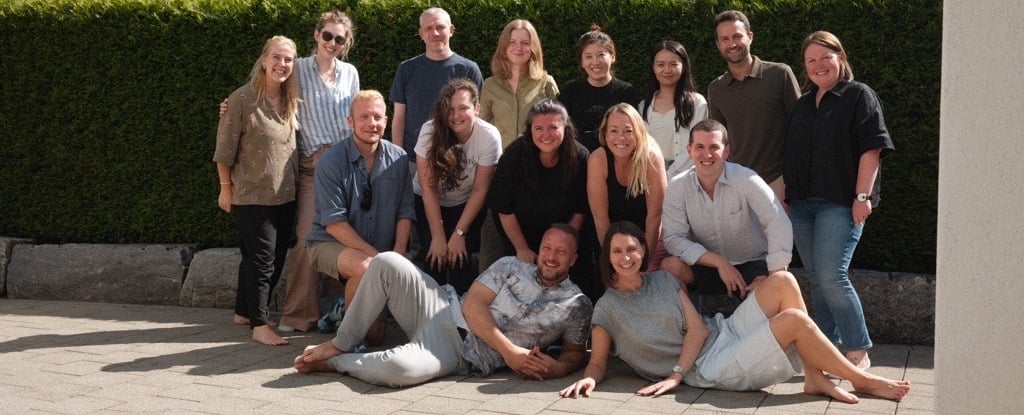
The aim was to align the Corporate Marketing strategy with MDPI's goal of becoming the world's most trusted OA publisher. While we provide a high-level publishing experience for our authors, as seen from our surveys, we need to keep building on our transparent and open communication to foster trust within the scholarly community and continue enhancing our reputation.
The Corporate Marketing team plays an important role as the mouthpiece for all our major activities within MDPI, especially those that model what it means to be a trusted partner. The purpose of the strategy meeting was to develop a feeling of trust in one another and an understanding of how to inspire trust in the stakeholders with whom we interact.
“We need to keep building on our transparent and open communication to foster trust within the scholarly community”

We conducted a set of activities to facilitate that sense of mutual trust and trustworthiness. Examples of some activities we worked on during this strategy-building event include:
- Exploring what trust means
- ‘Letter to self’
- ‘The brand I most trust’
- Most Trusted Academic Publisher
- ‘The brand I would like MDPI to become’
- ‘The 2029 MDPI Annual Report’
- Voice of Customer and Share of Voice – survey/data update on MDPI Brand Experience and Brand Perception
- Integrate Trust-Based Objective into Marketing Plan
- ‘Becoming the MDPI experience’
- ‘Trusting the next steps’
While two days is not enough to finalize a marketing strategy, it is sufficient to get everyone who attended into the mindset of the direction in which we are working. From here, we will develop a program with next steps on main projects, update communications, and collaborate with team leads to incorporate this approach into our work going forward.
As a marketing team, we can communicate our messages, but trust has to be built at every touchpoint in the stakeholder journey. Just talking about it isn’t enough. We need to be about it. That’s a role each of us plays, from editorial to IT, from marketing to HR. We must build trust from the inside out. It starts with each manager and resonates out via every team member.
As a company, our goal is to give all stakeholders with whom we interact – whether internal or external – the experience of working with an organization it can trust.
Coming Together for Science

MDPI in Poland: Krakow Office
In July, I had the pleasure of visiting our Krakow office, following my recent trip to Warsaw to meet with the Polish Ministry of Science and Higher Education.

During these visits, I prioritized meeting with our Office Manager, Editorial Director, Group Leads, and members from various teams, including editorial, production, marketing, and journal relationship specialists, to understand their roles and current challenges. Instead of a formal presentation, I opted for an open discussion, sharing updates from headquarters to engage with colleagues in a more personal way.
Our Krakow office has many things to be proud of, including a large number of PhD colleagues (over a third of its staff holds a PhD degree). Krakow provides an opportunity for expanding beyond the 100 colleagues we currently have, by adding new hires in departments including editorial, production and marketing, among others.
About our Krakow office
- Opened in 2020
- 99 staff members as at 1 August 2024
- Main Departments include Editorial, Production, English Department, JRS, PR
Our Krakow office participates in international conferences, conducts author trainings and scholar visits, and engages in local market outreach. The office is also a member of the Polish Chamber of Commerce for High Technology (IZTECH) and is working on expanding its local engagement.
Krakow is the second-largest city in Poland, with a population of about 800,000. It also has a large student population of around 128,000, with seven universities. This means that roughly one in every eight residents is a student.
Poland and MDPI

Poland is a crucial market for MDPI. From 2020 to June 2024, Poland ranked 7th in submissions and 5th in publications for MDPI research articles. As at 31 July 2024, Poland ranks 7th in total MDPI publications, with approximately 70,000 research papers.
Between 2020 and June 2024, 61,500 authors from Poland published with MDPI. As at 30 June 2024, there are 1,205 active Editorial Board Members (EBMs) from Poland, with 661 EBMs (55% of the total) having an H-index over 25.
We also have four Editors-in-Chief (EiC) from Poland leading our journals: Coatings, Venereology, Advances in Respiratory Medicine, and Limnological Review, along with six Section EiC.
In 2023, we received approximately 21,000 submissions from Polish-affiliated authors, of which 12,032 were published.
“Poland is a crucial market for MDPI”
Meeting with Ministry of Education

On 22 July, we visited Warsaw to meet with the Polish Ministry of Science and Higher Education.
We were pleased to learn that they are strong supporters of the OA publishing model and value MDPI’s approach to the peer-review process, including our high ethical standards for quality control.
In 2023 Polish authors predominantly published their papers in OA, with MDPI holding the largest market share in OA publications within the country.
Our commitment to collaborating with Polish institutions is evident through our 33 Institutional Open Access Program (IOAP) agreements with prestigious institutions such as the University of Warsaw, the University of Wroclaw, the Jagiellonian University, and Gdańsk University of Technology. Through IOAP discounts, a healthy waiver rate, and our peer-review voucher system, we provide the Polish scholarly community with significant savings in OA publishing. The Minister greatly appreciated these efforts and our commitment to offsetting some of the APC costs.
We discussed industry concerns about the threat of papermills and presented the preventive measures MDPI has in place to mitigate this risk and uphold high ethical standards. We informed them of our commitment to combating papermills, including our involvement with United2Act and the STM Research Integrity Hub, as well as our efforts to expand our research integrity team and explore proactive measures.
Closing Thoughts

MDPI Thought Leadership Op-ed on Open Access is Now Live on Politico
I am pleased to share that our thought leadership Op-ed piece on Open Access (OA) is now live on Politico. This is a nice push for continued influence and support of OA among policymakers and industry leaders.
Why Politico?
Politico's reputation as a highly credible and influential news platform makes it an important venue to reach key opinion leaders (KOL) from academia, policymakers, and thought leaders from many industries. This visibility helps promote the OA philosophy.
Open Access: A Moral Imperative for Progress
In this piece, I discuss the necessity of making scientific research freely available to all. I argue that publicly funded research should be publicly accessible, highlighting how OA democratizes scientific knowledge, accelerates research availability, and fosters collaboration.
“Open Access is a fundamental right for all citizens”
Democratizing scientific communication
The impulse to democratize scientific communication is nothing new. OA may seem like a recent innovation, but its principles have historical roots traceable to Europe in the 15th century. Just as the printing revolution accelerated the dissemination of new ideas, OA publishing unlocks new scientific insights that would otherwise only be accessible to a few.
Benefits for scholars: amplifying impact through Open Access
Authors publishing in an OA journal can expect more citations of their work, increasing its potential impact. Research findings that are freely available are more likely to be cited than those hidden behind a paywall. Freedom of access greatly increases the potential audience for each paper, fostering a sense of community among researchers worldwide. Heightened visibility can attract prospective collaborators and employers for young scientists. At MDPI, we believe that all these factors can only accelerate the advance of science. Additionally, authors retain copyright in their work instead of signing it away, permitting broader dissemination under Creative Commons licenses and increasing its capacity for impact.
The moral imperative
OA is not just a matter of scientific policy; it is a fundamental right for all citizens and a prerequisite for a brighter, more informed future. Publicly funded research should be a top priority, and I am pleased to see policy moving in this direction. Our capacity to generate transformative scientific insights has to be democratized. The question today is no longer whether we can afford to embrace OA; rather, it is whether we can afford not to.
Chief Executive Officer
MDPI AG
2 August 2024
MDPI Romania Author Training Sessions in May
In May, MDPI Romania held three author training sessions – one endorsing an external event and two stand-alone sessions.
The National Session of Scientific Student Communications took place at Technical University Cluj on 17 and 18 May 2024. MDPI Romania sponsored this event and contributed an author training session on the production of research papers and case study analyses. JRS Norbert Kiss gave a presentation called The World of Open Access to explain different open access publishing models and the benefits of open access publishing. His presentation highlighted the impact of open access publishing on scientific progress and innovation.
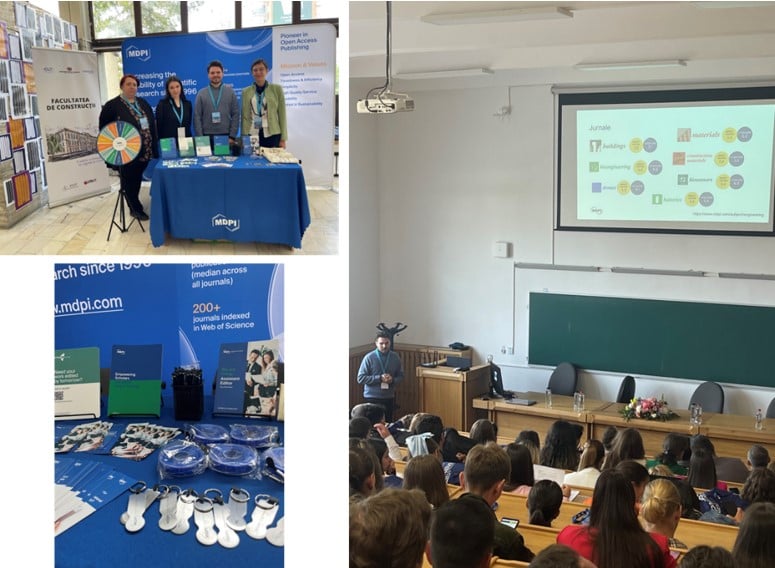
On 29 May 2024, MDPI Romania hosted an author training session for Ph.D. students, early career researchers, and professors at the Carol Davila University of Medicine and Pharmacy. In collaboration with Prof. Andreea Arsene, JRS Ioana Paunescu prepared two presentations: The Steps of the Publishing Process and Elaboration of a Peer Review Report. In her first presentation, she delved into MDPI’s history and mission, MDPI’s editorial process, and MDPI journals of various scopes that are accepting submissions. Her second presentation outlined the types of peer review, the contents of a peer review report by an MDPI reviewer, and the responsibilities of an MDPI reviewer.
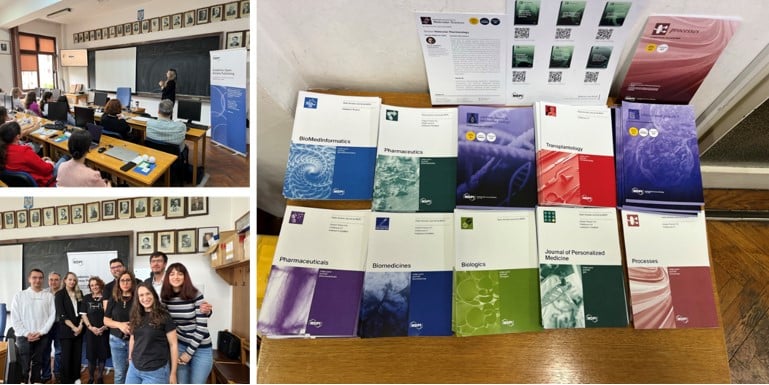
MDPI Romania also hosted an author training session at the Iasi University of Life Sciences on 29 May 2024. JRSs Laurentiu Preda and Cosmin Artan gave four presentations: Efficient Writing of an ISI-Indexed Scientific Article, Benefits of Publishing in the Open Access Model, Various Methods of Open Access Publishing, and MDPI Guide for the Article Review Process. The first three presentations offered guidance on how to improve academic writing, the fourth focused on how to write peer review reports. A highly interactive discussion followed the presentations, during which the JRSs provided extensive answers to attendees’ questions.
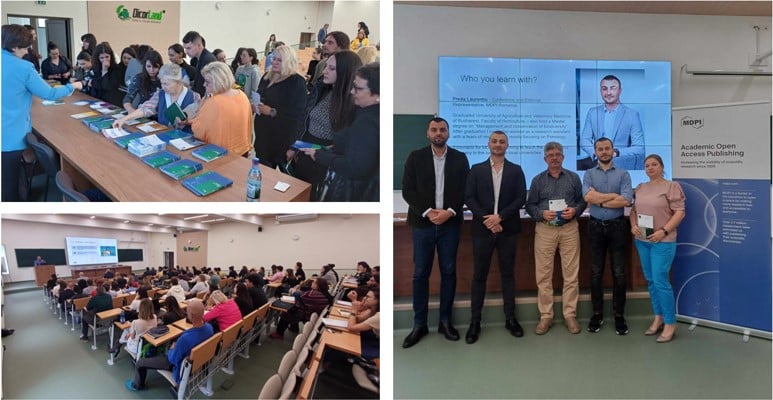
MDPI is grateful for all the attendees, speakers, and organizers involved in these events. Through their enthusiasm and dedication, these events were great successes.
19 July 2024
Meet Us at the Plant Genomics in China XXII, 19–22 August 2024, Hainan, China

Conference: Plant Genomics in China XXII
Organization: Genetic Society of China
Date: 19–22 August 2024
Place: Haikou, Hainan, China
MDPI journals will be attending Plant Genomics in China XXII as exhibitors. This meeting will be held in Haikou, Hainan, China, from 19 to 22 August 2024.
In order to fully demonstrate the latest achievements and progress in the field of plant genome research and promote the in-depth research of plant genomics in the country and the rapid development of the agricultural biotechnology industry, the 23rd National Congress is scheduled to be held in Haikou, Hainan, from August 19 to 22, 2024. The conference will invite experts, scholars and outstanding young scientists at home and abroad who have made outstanding achievements in plant genomics-related fields and have important academic influence to give academic reports. The language of the conference report is English. The organizing committee invites domestic and foreign colleagues and graduate students from relevant universities and research institutes to participate in this conference. This conference is the largest high-level academic event in the field of genetics research in China. This conference invites famous scholars, experts, young talents and entrepreneurs in the field of genetics to conduct in-depth exchanges.
The following MDPI journals will be represented:
- Plants;
- Genes;
- International Journal of Molecular Sciences (IJMS);
- Life;
- Biomolecules;
- Current Issues in Molecular Biology (CIMB);
- International Journal of Plant Biology (IJPB);
- Agronomy;
- BioTech.
If you will be attending this conference, please feel free to start a conversation with us. Our delegates look forward to meeting you in person and answering any questions that you may have.
19 July 2024
Meet Us at the 46th Congress of the Spanish Society of Biochemistry and Molecular Biology, 3–6 September 2024, A Coruña, Spain

MDPI will be attending the 46th Congress of the Spanish Society of Biochemistry and Molecular biology (46th SEBBM Congress), which will be held from 3 to 6 September 2024 in A Coruña, Spain.
The 46th SEBBM Congress will enjoy a wide range of plenary conferences, symposia, including the Hispanic-Luso Scientific Symposium and the Scientific Symposium of Education, meetings of the scientific groups of SEBBMs, poster sessions and the commercial exhibition of collaborating companies. We will be able to enjoy satellite activities such as the Research Initiation Course in Biochemistry and Molecular Biology, the Professional Development Forum for Young Researchers, and the activities of Biochemistry in the city, with exhibitions, scientific–artistic shows, round tables and scientific workshops.
The following MDPI journals will be represented at the conference:
- Cells;
- Biomolecules;
- CIMB;
- IJMS;
- Biomedicines;
- Organoids;
- Biology;
- BioTech;
- Biologics;
- Diagnostics;
- Medicina;
- BioMedInformatics;
- JMP;
- Genes.
If you are planning to attend the above conference, we encourage you to visit our booth and speak to our representatives. We are eager to meet you in person and assist you with any queries that you may have.
For more information about the conference, please visit the official website at https://congresos.sebbm.es/coruna2024/.
17 July 2024
The 30th International Conference on Magnetic Resonance in Biological Systems (ICMRBS 2024), 18–23 August 2024, Seoul, Republic of Korea

Conference: The 30th International Conference on Magnetic Resonance in Biological Systems (ICMRBS 2024)
Date: 18–23 August 2024
Place: COEX, Seoul, Republic of Korea
Organized by: Korean Magnetic Resonance Society (KMRS)
Conference Award: “MDPI Biomolecules Poster Award” sponsored by Biomolecules (ISSN: 2218-273X)
The International Council on Magnetic Resonance in Biological Systems (ICMRBS) organizes biennial conferences that have grown substantially in both size and scope since the initial meeting in 1964. Besides covering important new developments in the use of EPR and in vivo NMR, the meeting is widely considered one of the premier meetings in the rapidly growing field of protein and nucleic acid structure determination by multi-dimensional NMR techniques.
We would especially like to invite young researchers, including M.Sc. students, Ph.D. students, and post-docs, as we think this will be a great opportunity for them to share their scientific experience and interact with our network.
For more information, please visit the following link: https://www.icmrbs2024.org/.
10 July 2024
MDPI's Newly Launched Journals in June 2024
 Five new journals covering multiple subjects have launched their inaugural issue in June 2024. We are excited to be able to share with you the newest research rooted in the value of open access.
Five new journals covering multiple subjects have launched their inaugural issue in June 2024. We are excited to be able to share with you the newest research rooted in the value of open access.
We would like to express our deepest appreciation to all the Editorial Board Members and each journal will ensure its high-quality output using excellent editorial and rigorous peer review processes, to ensure that the articles achieve high impact and visibility.
Please feel free to browse and discover more about the new journals below.
|
Journal |
Founding Editor-in-Chief |
Journal Topics (Selected) |
 |
Prof. Dr. Marco Ranucci, IRCCS Policlinico San Donato, Italy |
anaesthetic medications; blood and fluid management; pain management; critical care; critical illness | view journal scope | submit an article |
 |
Dr. Giovanni E. Cacciamani, University of Southern California, USA |
surgical/procedural complications; complications; perioperative adverse events; postoperative adverse events | view journal scope | submit an article |
 |
Prof. Dr. Gassan Hodaifa, Universidad Pablo de Olavide, Spain |
laboratory management; laboratory safety; protective equipment; laboratory problems and challenges; laboratory Innovation | view journal scope | submit an article |
 |
Prof. Dr. Jan S. Suchodolski, Texas A&M University, USA |
companion animals health and disease; veterinary care and nutrition; genetics and genomics; behavior and welfare; human-animal relations | view journal scope | submit an article |
 |
Prof. Dr. Pierfrancesco De Paola, University of Naples Federico II, Italy |
real estate appraisal; economic and financial valuation of real estate projects; sustainable real estate; housing and urban economics | view journal scope | submit an article |
We wish to thank everyone who has supported the development of open access publishing. You are welcome to send an application here, or contact the New Journal Committee (newjournal-committee@mdpi.com) if you would like to create more new journals.
1 July 2024
Meet Us at the 31st International Carbohydrate Symposium (ICS2024), 14–19 July 2024, Shanghai, China

MDPI will be attending the 31st International Carbohydrate Symposium (ICS2024), which will be held from 14 to 19 July 2024 in Shanghai, China.
ICS2024 will follow the convention of the previous ICS symposiums to provide a global forum for researchers engaging in all aspects of carbohydrates. Besides classical topics on carbohydrate chemistry, chemical glycobiology, and glycobiology, the current developments of carbohydrates and glycotechnologies in the fields of the diagnosis and therapy of diseases, nutrients and cosmetics, agriculture and biofuels, and materials will be highlighted. ICS2024 will reflect the state-of-art as well as future trends of the glycosciences and forge communication and corporations between glycoscientists from various areas and disciplines.
The following topics will be covered:
- Glycochemistry;
- Glycobiology;
- Carbohydrate drugs;
- Sugar vaccines;
- Carbohydrate materials.
The following MDPI journals will be represented at the symposium:
- Nutrients;
- IJMS;
- Molecules;
- Nutraceuticals;
- Foods;
- Biomolecules;
- Marine Drugs;
- Vaccines;
- CIMB;
- BioChem;
- Applied Sciences;
- Antibodies.
If you are planning to attend the above conference, we encourage you to visit our booth and speak to our representatives. We are eager to meet you in person and assist you with any queries that you may have.
For more information about the conference, please visit the official website at https://ics2024.casconf.cn/.
25 June 2024
Meet Us at the ASHG Annual Meeting 2024, 5–9 November 2024, Denver, Colorado, USA

MDPI will attend the ASHG Annual Meeting 2024, held in Denver, Colorado, USA, from 5 to 9 November 2024.
The ASHG Annual Meeting is the largest human genetics and genomics meeting and exposition in the world. Held in the fall, it provides a forum for the presentation and discussion of cutting-edge science in all areas of human genetics. Highlights include invited symposia; abstract-driven plenary, platform, and poster sessions; education/trainee workshops; and career opportunities and networking events.
The following MDPI journals will be represented:
- Genes;
- IJMS;
- Biomedicines;
- Diagnostics;
- Cancers;
- Biomolecules;
- Humans;
- Applied Biosciences;
- DNA;
- Cardiogenetics;
- Vaccines;
- Life;
- Epigenomes;
- Biology;
- CIMB;
- JCDD;
- ncRNA;
- Diseases;
- BioMed;
- Biomedinformatics.
If you plan on attending this conference, please stop by our booth #1058 and speak with us. Our delegates look forward to meeting you in person and answering any questions that you may have.
For more information about the conference, please visit the following link: https://www.ashg.org/meetings/2024meeting/.
25 June 2024
Meet Us at the CRS 2024 Annual Meeting and Expo (CRS 2024), 8–12 July 2024, Bologna, Italy

Conference: the CRS 2024 Annual Meeting and Expo (CRS 2024)
Date: 8–12 July 2024
Location: Bologna, Italy
This conference will be the 51st annual conference of the Controlled Release Society. The annual CRS conference is the most important one in the pharmaceutics field. The main topics of the conference include Nanomedicine and Nanoscale Delivery, Immuno Delivery, Oral Delivery, Skin and Mucosal Delivery, Ocular Delivery, Bioengineering, Gene Delivery and Gene Editing, Alternative Methods to Animal Testing, Long-Acting Drug Delivery Formulations, Delivery to the Nervous System, Artificial Intelligence, and Predictive Models in Pharmaceutical Technologies.
MDPI will be attending the CRS 2024 Annual Meeting and Expo (CRS 2024). We welcome researchers from different backgrounds to visit and share their latest ideas with us.
The following MDPI journals will be represented:
- Pharmaceutics;
- Molecules;
- Pharmaceuticals;
- Future Pharmacology;
- Applied Biosciences;
- IJMS;
- Gels;
- BioMedInformatics;
- CIMB;
- JNT;
- Life;
- Biomolecules.
If you plan to attend this conference, please contact us online. Our delegates look forward to meeting you in person at booth #29 and answering any questions you may have. For more information about the conference, please visit the following website: https://2024crsannualmeeting.eventscribe.net/.
21 June 2024
Biomolecules | Academic Editors’ Selected Papers in the “Cellular Biochemistry” Section from the First Quarter of 2024
The “Cellular Biochemistry” Section of Biomolecules (ISSN: 2218-273X) provides insight into the roles of specific biochemical pathways and processes in inherited and acquired diseases.
Following the kind recommendation of the Section Editor-in-chief, Prof. Dr. Anna Rita Franco Migliaccio, we selected some interesting work published in this Section on cellular biochemistry. We would like to thank all of our authors' contributions and hope they can continue to contribute their interesting work to the journal.
You can access and read the chosen papers below.
1. “Microbiota Metabolite Profiles and Dietary Intake in Older Individuals with Insomnia of Short vs. Normal Sleep Duration”
by Carmel Even, Faiga Magzal, Tamar Shochat, Iris Haimov, Maayan Agmon and Snait Tamir
Biomolecules 2024; 14(4), 419; https://doi.org/10.3390/biom14040419
Available online: https://www.mdpi.com/2218-273X/14/4/419
2. “Mitochondrial Dysfunction as the Major Basis of Brain Aging”
by Stephen C. Bondy
Biomolecules 2024; 14(4), 402; https://doi.org/10.3390/biom14040402
Available online: https://www.mdpi.com/2218-273X/14/4/402
3. “The Influence of Lysosomal Stress on Dental Pulp Stem Cell-Derived Schwann Cells”
by Karen Libberecht, Nathalie Dirkx, Tim Vangansewinkel, Wendy Vandendries, Ivo Lambrichts and Esther Wolfs
Biomolecules 2024; 14(4), 405; https://doi.org/10.3390/biom14040405
Available online: https://www.mdpi.com/2218-273X/14/4/405
4. “Mitochondrial and Nuclear DNA Variants in Amyotrophic Lateral Sclerosis: Enrichment in the Mitochondrial Control Region and Sirtuin Pathway Genes in Spinal Cord Tissue”
by Sharon Natasha Cox, Claudio Lo Giudice, Anna Lavecchia, Maria Luana Poeta, Matteo Chiara, Ernesto Picardi and Graziano Pesole
Biomolecules 2024; 14(4), 411; https://doi.org/10.3390/biom14040411
Available online: https://www.mdpi.com/2218-273X/14/4/411
5. “Astrocytes: The Stars in Neurodegeneration?”
by Katarina Stoklund Dittlau and Kristine Freude
Biomolecules 2024; 14(3), 289; https://doi.org/10.3390/biom14030289
Available online: https://www.mdpi.com/2218-273X/14/3/289
6. “Solute Transport through Mitochondrial Porins In Vitro and In Vivo”
by Roland Benz
Biomolecules 2024; 14(3), 303; https://doi.org/10.3390/biom14030303
Available online: https://www.mdpi.com/2218-273X/14/3/303
7. “Monogenic Disorders of ROS Production and the Primary Anti-Oxidative Defense”
by Nana-Maria Grüning and Markus Ralser
Biomolecules 2024; 14(2), 206; https://doi.org/10.3390/biom14020206
Available online: https://www.mdpi.com/2218-273X/14/2/206
8. “Mechanisms and Functions of the RNA Polymerase II General Transcription Machinery during the Transcription Cycle”
by Stephen R. Archuleta, James A. Goodrich and Jennifer F. Kugel
Biomolecules 2024; 14(2), 176; https://doi.org/10.3390/biom14020176
Available online: https://www.mdpi.com/2218-273X/14/2/176
9. “Factors and Mechanisms of Thyroid Hormone Activity in the Brain: Possible Role in Recovery and Protection”
by Laura Sabatino, Dominga Lapi and Cristina Del Seppia
Biomolecules 2024; 14(2), 198; https://doi.org/10.3390/biom14020198
Available online: https://www.mdpi.com/2218-273X/14/2/198
10. “Cloflucarban Illuminates Specificity and Context-Dependent Activation of the PINK1–Parkin Pathway by Mitochondrial Complex Inhibition”
by Adrian T. Ramirez, Zeyu Liu, Quanbin Xu, Sarah Nowosadtko and Xuedong Liu
Biomolecules 2024; 14(3), 248; https://doi.org/10.3390/biom14030248
Available online: https://www.mdpi.com/2218-273X/14/3/248
11. “Mitochondrial Dysfunction and Protein Homeostasis in Aging: Insights from a Premature-Aging Mouse Model”
by Jaime M. Ross, Lars Olson and Giuseppe Coppotelli
Biomolecules 2024; 14(2), 162; https://doi.org/10.3390/biom14020162
Available online: https://www.mdpi.com/2218-273X/14/2/162
As an open access format, you have free and unlimited access to the full text of all the articles published in Biomolecules: https://www.mdpi.com/journal/biomolecules.




